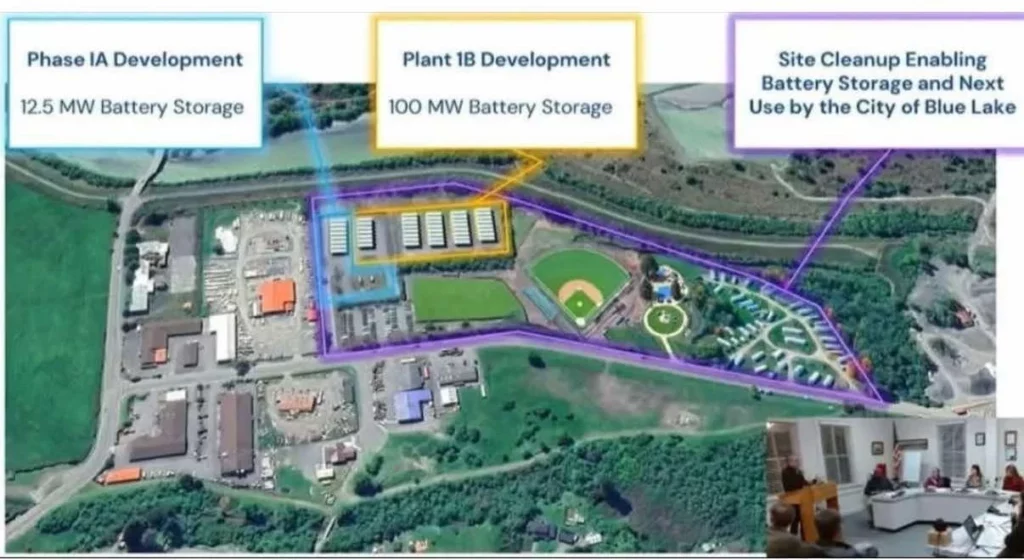Blue Lake Weighs Battery Storage Proposal Amid Community Concerns

The Blue Lake City Council is weighing a big decision that could change the future of the city’s old, defunct power plant. The council held a special meeting last Thursday, and according to Sage Alexander of the Times-Standard, they got an update on a deal with Power Transitions—a Houston-based company that repurposes old energy sites for renewable power projects.
Power Transitions wants to turn parts of the plant into a 20-megawatt Battery Energy Storage System, or BESS. Essentially, this facility would store extra electricity and send it back to the grid when demand spikes. Their plan includes demolishing parts of the old plant while keeping some existing infrastructure to make the project work. The company is looking to buy two acres of city-owned land and lease four more, but the deal hinges on them handling demolition costs themselves.
Timing is tight. Pacific Gas & Electric has limited windows for connecting projects like this to the grid, with the next opportunity coming up in March. That’s why the council is considering a two-year option agreement, which would give Power Transitions the right to the land. A final decision is expected by or before March 10.
The proposal sparked mixed reactions among council members. Some, like Kat Napier and Chris Firor, saw the phased approach as a reasonable compromise. Others, including Mayor Pro Tem Elise Scafani, were wary about how fast things are moving and raised concerns about transparency in the negotiations. Scafani also wanted input from the Redwood Coast Energy Authority, or RCEA, a local agency focused on renewable energy solutions.
RCEA later clarified to Redheaded Blackbelt that it’s open to energy storage projects across Humboldt County but hasn’t prioritized the Blue Lake site. While RCEA does have an agreement with the city to explore options for the old plant, it stressed that no specific developer was ever chosen. The agency also made it clear that it doesn’t engage with individual developers or speculate on which projects might get approved.
That said, the Blue Lake site does have some advantages. RCEA pointed out that because it already has grid infrastructure in place, it would be cheaper and quicker to use compared to undeveloped locations. But even with those benefits, there’s no guarantee that RCEA will back the project.
Community reaction has been strong. More than 100 people attended a town hall on Sunday, and most were opposed to the BESS plan. A petition against the project, launched by local resident Terri Bayles, has already gathered 141 signatures.
Opponents have raised several concerns. The facility would be located near the Blue Lake levee, which has a history of breaches, including in 1955 and 1964. A major flood could lead to dangerous water intrusion and potential fires. While lithium iron phosphate batteries are more stable than other types, they still carry risks of overheating or electrical faults that could lead to fires. The site is also upstream from the Mad River’s pump station, which provides drinking water to much of Humboldt County, and a fire or flood-related contamination could be disastrous. Economically, critics argue that Blue Lake wouldn’t see much benefit, as the stored electricity wouldn’t be used locally. They also worry about lower property values, higher insurance costs, and negative effects on tourism. Additionally, concerns have been raised about the potential for noise pollution from the cooling systems and the impact of bright floodlights and high-voltage equipment on the town’s aesthetic.
On the other side, supporters see this as a step toward renewable energy and a more stable power grid. California has been expanding BESS projects to help prevent blackouts and better integrate solar and wind energy. If done right, storage facilities like this can reduce reliance on fossil fuels and improve energy resilience during outages.
Economically, the project could be a win for Blue Lake. The city wouldn’t have to pay to tear down the deteriorating power plant, and leasing land to Power Transitions could bring in extra revenue. Former Mayor Adelene Jones even called the old plant an “attractive nuisance,” noting that it has become a safety hazard—there was even a recent electrocution incident on the site.
The Blue Lake City Council is set to discuss the BESS proposal again tonight, Tuesday, February 25, 2025, at 6:30 p.m. The meeting will take place at the Skinner Store, 111 Greenwood Road, Blue Lake.
For those wanting to attend remotely –
- Zoom Meeting ID: 869 6524 7875
- Passcode: 573789
- Link: https://us02web.zoom.us/j/86965247875?pwd=BRbJ9rzbDHF5KYQ0ZxVH6WMPXkxHfs.1
- City Council Agenda: Click here.
- City Council Meeting Packet: Click here.
